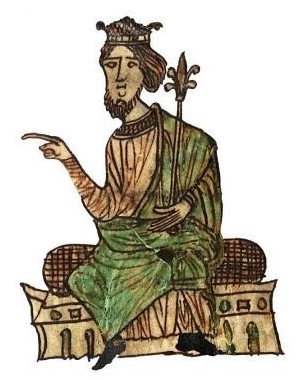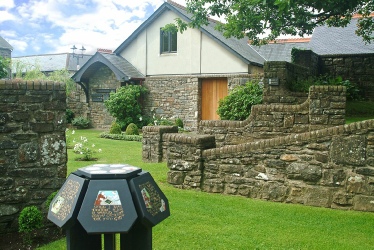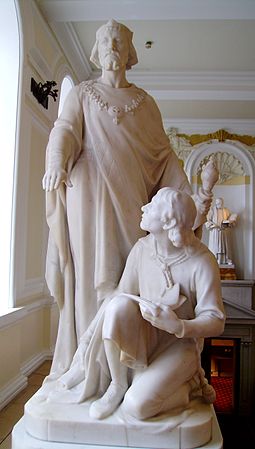Eleven centu ries after his death, very few facts are certain about the life of Hywel Ap Cadell (d.950), but Hywel Dda is still known today. Indeed, the title Hywel Dda University Health Board is a well-known name throughout South West Wales.
ries after his death, very few facts are certain about the life of Hywel Ap Cadell (d.950), but Hywel Dda is still known today. Indeed, the title Hywel Dda University Health Board is a well-known name throughout South West Wales.
After conquering the old dynasty of Cunedda, Hywel’s great grandfather, Merfyn Frych, became king of Gwynedd. According to history, Merfyn Frych was originally from the Isle of Man. The ancient royal family of Cunedda had reigned in Gwynedd for four hundred years before being replaced by the prince of the Isle of Man.
Merfyn was a member of one of the most prominent royal families of Wales because most of the princes of Gwynedd and Deheubarth in the Middle Ages were his descendants. Merfyn's son, Rhodri Mawr (d.877), was Hywel’s grandfather and, through the occupation of Powys and Ceredigion, Rhodri expanded his father’s kingdom as well as his power. Cadell, Hywel's father, died in 910 and Hywel inherited the lands he had acquired in South Wales.
Llywarch and Rhodri ap Hyfaidd, the last of the old royal family of Dyfed, were both killed by 905. Cadell and his son Hywel then added Dyfed to Ceredigion and Ystrad Tywi to create the kingdom of Deheubarth and, in order to strengthen his grip on his new territory, Hywel married Elen, the daughter of Llywarch. Hywel was already governing Seisyllwg by this time.
The royal dynasty of Brycheiniog came to an end when Tewdwr Ap Gruffudd died around 930 and Hywel appears to have occupied that kingdom as well.
The kingdom of Deheubarth was a pivotal unit in Welsh history over the next four hundred years and, after the assassination of Idwal Foel by the English in 942, it was united with the territory of Gwynedd.

In capturing the kingdom of Gwynedd, Hywel completely ignored the rights of Idwal Foel's sons. Powys was under the control of Gwynedd at the time and so that also came under his control. Although Hywel was later given the epithet ‘The Good’, he may well have ordered the murder of his father-in-law. With the exception of Glamorgan and Gwent, Hywel was ‘king of the kingdom that extended from Prestatyn to Pembroke' when he died in 950.
Hywel co-operated with his brother Clydog for ten years until Clydog was killed in 920. Their third brother Meurig may have been the murderer but it made Hywel the sole ruler of Deheubarth. By diligent and tireless endeavour, he succeeded to reign over most of Wales, indeed he came closer to establishing his authority over the whole of Wales than any king before him.
Alfred ‘the Great’ became king of Wessex in 871 after a great victory over the Danes, and was highly regarded by British rulers. The lords and princes of Wales decided to get help and patronage from him, so he was to rule over the whole of Wales. The order of lordship of Anglo-Saxon kings over Wales was continued because this was part of a chain that supported the unity of the Christians against the pagan Vikings.
Idwal Foel was killed by the English in 942 for revolting against the regime, and Rhodri Mawr, Hywel's grandfather, was killed by the English in the previous century while fighting to defend Powys.
The greatest ambition of the Anglo-Saxon kings was to extend their empire to include the Celtic territory and peoples of Britain. During the tenth century the Vikings were once again defeated in Northumbria, by Edward the Elder, his son Athelstan and their Anglo-Saxon army. Following this victory Athelstan gave himself the title of 'King of Great Britain' and the English kingdom came into being.
Hywel was prepared to acknowledge that rebellion against England would in many ways be futile and expensive. In July 927 Hywel, along with the king of Scotland and other leaders, met at Eamont near Penrith in Cumbria to discuss peace terms with Athelstan. Athelstan also met the Welsh leaders in Hereford in the same year. Athelstan was obliged to obey and pay homage consisting of 20 pounds of gold, 300 pounds of silver, and 25,000 oxen a year.
When he died Hywel was described as the 'King of the Britons' (the Welsh) in the annual records of the period. However, he was described as a 'little king' or vice-king on the charters of the English kin g's court.
g's court.
Hywel's main goal during this period was to protect the peace of his kingdom. The price that Hywel had to pay was in complete obedience to the will of the King of England. He was a regular visitor to the king's court under command. Hywel's response to Athelstan's behaviour may have been a sign of personal weakness, but it is fair to remember that Hywel had successfully avoided any form of bloody war with the Anglo-Saxons during his reign of Wales.
Like many contemporary lords or kings throughout Europe, Hywel was compassionate in his efforts to spread his territory. However, he did not aim to create a united Wales, but rather his vicious determination to secure the future of his dynasty. So how did he get the title 'Hywel Dda'?
Hywel travelled to Rome in 929 perhaps to empower his own image as a devout Christian king. Rome was the centre of the Christian Faith and Hywel's journey reflected the fact that Wales was part of the Christian world of the Middle Ages. But it was as a result of the codification of Welsh law that Hywel was given the surname 'Good'.
Law is one of the most spectacular creations of Welsh culture. Its medical tradition was also at the forefront, this was an important part of ancient Welsh law as well as that of Hywel. Hywel inevitably came under the influence of the English legal system when he was a visitor to the English Court as well as the legal methods of some continental countries. Throughout the centuries, experts in the ancient words of Welsh law, as well as scholars of the legal written methods of the clergy of different ages, have examined the development of Hywel's law in detail. Two important clergy names are Blegywryd and Cynyr ap Cadwgan.

The ordinances and law of the Christian faith which took precedence over any kind of secular law of the Middle Ages, had to conform to the regimes of the Roman Church. The Normans had great reservations about parts of Hywel's law, the original Welsh law. Welsh common law, for example, allowed distant cousins to marry each other. In the Welsh legal system, the rights of the patient were important, even to the most lowly of patients. The doctor had legal implications in the community. The rights of women and girls and of course the rules of ‘galanas’ are also noted.
Latin is the language of the oldest surviving version; it is a copy written about 1230, from a text written about 1175, that is, two centuries after the days of Hywel. A strong tradition rather than strong historical evidence links Hywel with his comprehensive legal system. There is no mention of Hywel’s activities in connection with the making of law for Wales in any source of the period.
Thirteenth-century law books set out how Hywel Dda, king or prince of Wales, held a large assembly comprising representatives of every commote in Wales. The location was an old white house on the river Taf in Dyfed and was intended to 'defy the laws of the country and impose the king's authority on them'.
Hywel is the only Welsh prince or king who has made a coin with his name on it. This coin is a penny minted in Chester and which conveys the status and authority of 'Hywel Frenin' in the Middle Ages.
References:
A History of Wales - John Davies
Tywysogion - Huw Pryce with Richard Wyn Jones & Spencer Smith
National Library of Wales: Dictionary of Welsh Biography - Hywel Dda
Related Biographies:
Blegywryd - scholar Idwal Foel - king of Gwynedd
Hywel Dda
